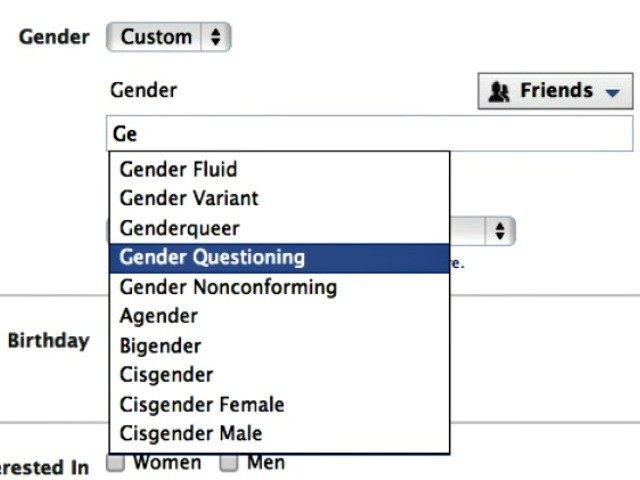Facebook is now allowing users who find it hard to express their sex with the 58 existing field options to create their own gender identity by making the option fill-in-the-blank.
While the network’s form originally offered two options, male or female, in February of 2014 it was updated to include alternatives for agender, androgenous, bigender, cisgender, non-binary, and many more.
“Last year we were proud to add a custom gender option to help people better express their identities on Facebook,” a post from the group Facebook Diversity reads.
The post continues: “We collaborated with our Network of Support, a group of leading LGBT advocacy organizations, to offer an extensive list of gender identities that many people use to describe themselves. After a year of offering this feature, we have expanded it to include a free-form field.”
Facebook Diversity says that now those who do not identify with the pre-populated list of gender identities are able to add their own.
One revision made last year, the option to add up to ten different gender terms, will remain unchanged, the group says. The option also gives users the ability to hide their custom identity from certain audiences.
“We recognize that some people face challenges sharing their true gender identity with others, and this setting gives people the ability to express themselves in an authentic way,” the group states.
Users who decide to use a custom gender identity can also choose their preferred pronoun, while the “interested in” category remains unchanged, giving the option for women, men, or no answer, by simply hiding the field.
According to a report from the AP, Facebook software engineer Ari Chivukula, who identifies as transgender, was a member of the team that created the free-form option.
“We’re hoping this will open up the dialogue,” Chivukula told the AP.
GLAAD President & CEO Sarah Kate Ellis is praising the change:
By empowering people to talk about their gender in their own words, Facebook continues to be a leader in its commitment to respecting and protecting LGBT users, Part of being who you are is just being able to describe yourself in a way that feels right to you.
The expanded custom gender option is only available for users who use Facebook in US English.
